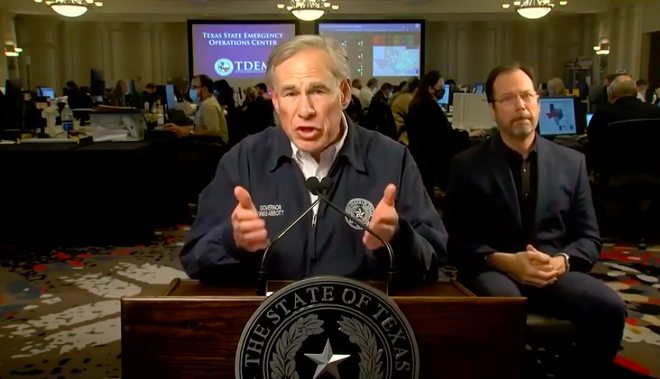
It’s now been two years since Winter Storm Uri sank Texas into a deep freeze and brought the state’s electric grid to the brink of total collapse. Upon signing into law a series of legislative changes at the end of the 2021 session, GOP Gov. Greg Abbott infamously declared mission accomplished on Texas’ response to the energy disaster. “Bottom line is that everything that needed to be done was done to fix the power grid in Texas,” he said. That line hung over his head like a political anvil as the state’s grid operator ERCOT has faced repeated close calls in the face of subsequent extreme weather, struggling to meet record-level electricity demands.
Meanwhile, the newly revamped Public Utility Commission (PUC) was — at the Lege’s behest — crafting a drastic overhaul of the state’s electricity market to ensure that the grid could reliably meet the increasing demands of a rapidly growing population. The focus of this redesign has largely been centered on the supply side of the equation — how to incentivize generators to build new natural gas power plants — while sidelining questions about how to lower consumer demand. This months-long process — led by Abbott-appointed PUC Chairman Peter Lake—came to a close in January when the Commission unanimously approved a contentious, convoluted, complicated thingamajig called the “Performance Credit Mechanism.” Only slightly less jargon-y in acronym form, the PCM would effectively deliver lucrative credits to power generators—such as energy giants Vistra and NRG—that are able to provide energy during certain high-demand periods. Electricity retailers—the utilities you pay your bills to—would pay for those credits and, naturally, pass the cost on to everyday consumers.
That policy proposal, which has never been used in the United States, received staunch resistance from the start. The PUC’s own energy consultant recommended against the policy because it “entails significant risk because of its novelty,” as did ERCOT’s independent monitor. All members of the Texas Senate business and commerce committee that oversees grid issues sent a letter to the PUC telling it to put its policymaking process on pause. Big business groups like Texas Manufacturers and the Oil & Gas Association came out against it on the grounds that it would increase their energy bill, as did consumer advocacy groups. The policy is estimated to cost at least $400 million a year to electricity customers while many experts question whether it will actually do anything to prompt new power plants.
Texas energy expert Doug Lewin has said the provision merely hands a “blank check” to existing power generators, leaving customers to once again foot the bill. Beyond that, this redesign will likely exacerbate already growing market dominance by a handful of energy giants (again, think Vistra and NRG) while further gutting consumer choice—the supposed crown jewel of Texas’ unusually deregulated market.
Apart from Abbott and the Commission, the key booster of the PCM is Texas Competitive Power Advocates, a lobby group composed of the largest power plant operators in the state. The group helped revive the political life of the PUC’s redesign when its leader pledged in testimony before the Legislature that, if the PCM were implemented, 4,500 megawatts of new power generation would come online. The governor himself cited that industry pledge when he put his full weight behind the PUC’s model. But the Utility Commission’s vote is only the beginning of a long fight over grid policy, since the agency has now referred the matter to the famously erudite minds of the Texas Legislature.
Within hours of the PUC’s decision, GOP state Senator Charles Schwertner — who authored key grid legislation in 2021 and chairs the business and commerce committee — blasted the move. He said the PUC “chose to ignore the clear direction of the Legislature [by] voting to replace the state’s competitive energy market with a costly and complex proposal that is unlikely to deliver the dispatchable generation resources that Texas needs.”
Schwertner and his committee will likely serve as the tip of the spear in Republican Lieutenant Governor Dan Patrick’s ongoing policy fights over grid reform — which first began in 2021 with a spat between Abbott appointees and the state House over repricing schemes. Patrick has made increasingly loud noises about wanting more significant policies guaranteeing new natural gas power plants beyond what the PUC has come up with. And Schwertner has effectively said such measures are in the works, saying his committee “will hold hearings and consider whatever legislation is necessary to correct this error and fulfill our obligation to the people of Texas.” (The senator spent the committee’s first hearing in Travis County jail after he was arrested for drunk driving overnight.)
One overlying factor in this policy battle is energy market ideology. Winter Storm Uri in 2021 exposed the deep flaws of the once-vaunted Texas model of a deregulated “energy-only” grid that pays generators solely for power produced, which means operating on a razor’s edge without reserves. With its new proposal, the PUC would effectively create a version of a “capacity market,” where consumers pay a certain amount to keep energy generators on reserve in case of emergency. This adds cost but helps ensure reliability. Rather than simply mimic California — quelle horreur — the PUC aims to build an untested and uncertain road to a similar end, but it’ll have to pause long enough for our fearless leaders to come swinging their own political sledgehammers. Viva the Lege.
Coming soon: SA Current Daily newsletter. We’ll send you a handful of interesting San Antonio stories every morning. Subscribe now to not miss a thing.Follow us: Google News | NewsBreak | Instagram | Facebook | Twitter
















